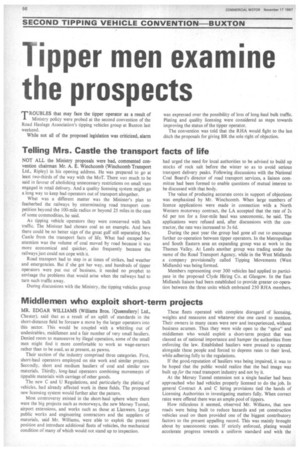Telling Mrs. Castle the transport facts of life
Page 58

If you've noticed an error in this article please click here to report it so we can fix it.
NOT ALL the Ministry proposals were bad, commented convention chairman Mr. A. E. Winchcomb (Winchcomb Transport Ltd., Ripley) in his opening address. He was prepared to go at least two-thirds of the way with the MoT. There was much to be said in favour of abolishing unnecessary restrictions on small vans engaged in retail delivery. And a quality licensing system might go a long way to keep bad operators out of transport altogether.
What was a different matter was the Minister's plan to featherbed the railways by exterminating road transport competition beyond the 100-mile radius or beyond 25 miles in the case of some commodities, he said.
As tipping vehicle operators they were concerned with bulk traffic. The Minister had chosen coal as an example. And here there could be no better sign of the great gulf still separating Mrs. Castle from the transport facts of life. What had escaped her attention was the volume of coal moved by road because it was more economical and quicker, also frequently because the railways just could not cope with it.
Road transport had to step in at times of strikes, bad weather and emergencies. But if she got her way, and hundreds of tipper operators were put out of business, it needed no prophet to envisage the problems that would arise when the railways had to turn such traffic away.
During discussions with the Ministry, the tipping vehicles group had urged the need for local authorities to be advised to build up stocks of rock salt before the winter so as to avoid serious transport delivery peaks. Following discussions with the National Coal Board's director of road transport services, a liaison committee had been formed to enable questions of mutual interest to be discussed with that body.
The value of producing accurate costs in support of objections was emphasized by Mr. Winchcomb. When large numbers of licence applications were made in connection with a North Western motorway contract, the LA accepted that the rate of 2s 6d per ton for a four-mile haul was uneconomic, he said. The applications were refused and, after discussions with the contractor, the rate was increased to 3s 6d.
During the past year the group had gone all out to encourage further co-operation between tipper operators. In the Metropolitan and South Eastern area an expanding group was at work in the Thames Valley. At Leeds another group was trading under the name of the Road Transport Agency, while in the West Midlands a company provisionally called Tipping Movements (West Midlands) was being formed.
Members representing over 300 vehicles had applied to participate in the proposed Clyde Hiring Co. at Glasgow. In the East Midlands liaison had been established to provide greater co-operation between the three units which embraced 250 RHA members.
















































































































































